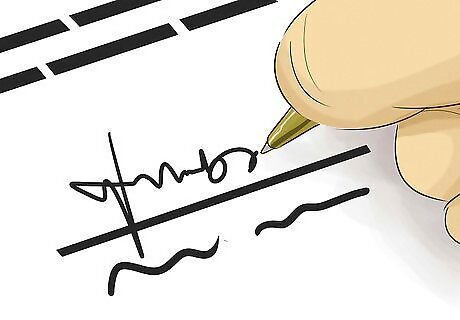
views
X
Research source
Notifying the Employee

Calculate the overpayment. As soon as a possible overpayment is noticed, you must review the employee's payroll and related records to determine what the employee should have been paid, and the difference between what the employee should have been paid and what the employee was paid. Try to find the source of the problem so you can correct it and keep it from continuing to happen. This also will help you determine whether it was a one-time thing or has happened on several paychecks. If it turns out the employee has been overpaid over the course of several paychecks, you must determine the date when the error was introduced so you can determine the extent of the overpayment.

Send the employee written notice. Once you know the exact amount the employee was overpaid, give the employee a letter stating that they were accidentally overpaid and providing a calculation of the amount the employee owes you. Write a brief letter in business format stating that according to your records, the employee was overpaid. List the specific amount as well as the dates of the paychecks that included an overpayment. Set a date and time at which you want to meet to discuss the options available to the employee to return the amount he or she was overpaid. You may want to attach proof of the overpayment, or you can provide this information to the employee at his or her request. Sign and date the notice, then make a copy of it for the employee's personnel file.

Discuss the issue with the employee in person. After you give the employee written notice, arrange a meeting with him or her to figure out what arrangements can be made to get the accidental overpayment back. Before the meeting takes place, review your state's laws on deducting the pay from the employee's paycheck. Typically you are allowed to do this, but not without the employee's knowledge and consent. Arrange a meeting with the employee in private to talk about various options for paying back the overpayment. If the employee expresses reluctance to repay the money, remind them that they have a legal duty to return the money, just as you would have a duty to pay them if their paycheck was short.
Correcting the Problem

Have the employee sign an acknowledgement of overpayment. Getting a signed, written acknowledgement from the employee protects you in the event you have to deduct money to cover the overpayment from the employee's check without his or her consent. Written acknowledgement also protects you if the employee claims you took too much out of future paychecks. Make sure you include the amount of overpayment on the acknowledgement form. Make a copy for the employee to keep for their records, and retain the original in the employee's personnel file along with your original notice.

Arrange to have the overpayment deducted from future paychecks. If the employee is unable to pay the money back right away, you may be able to get his or her agreement to take money out of the next paycheck to cover the amount of the overpayment. Federal law permits you to withdraw the entire amount from the employee's next paycheck, even if the amount would cut into the minimum wage or hours the employee must be paid. However, some states limit the amount you can withdraw from each paycheck. Depending on the amount you overpaid the employee, this may mean you have to take a smaller amount out of several paychecks to make up the difference. You also may be able to work out an agreement with the employee to take out a certain amount each paycheck until the overpayment is returned without causing the employee financial difficulties. If you make an agreement with the employee, make sure you get it in writing. Sign it and have the employee sign it, then make a copy for the employee's records and keep the original. Keep in mind that you cannot legally charge the employee interest on the amount owed, regardless of how long it takes you to collect the overage.

Consider other options. If the employee refuses to pay the money back or is causing difficulty, you may have to terminate the employee or even sue them to get the money back that you accidentally overpaid them. Terminating the employee won't get your money back, but the threat of termination may encourage the employee to be a little more cooperative – especially if you remind them that it will be a termination for cause, which may mean they aren't eligible for unemployment benefits. If the employee refuses to return the amount you overpaid, this technically is considered theft. You can file a lawsuit in civil court to recover the money, but depending on the amount of overpayment, it may not be worth it, given the time investment, attorney's fees, and court costs. Some states don't allow business entities to file a lawsuit in small claims court. However, if your state does and the amount of overpayment falls below the small claims threshold, this can be a quicker way to get a court order for your money. Keep in mind that even if you get a court order, you still have to enforce the judgment. One of the most common methods of enforcing money judgments is to garnish wages.
Preventing Future Errors

Maintain accurate records. Accidental overpayments are more likely when employees cash in vacation time or sick leave. Both employees and employers can help prevent these overpayments by double-checking accrual of hours periodically. If leave is requested, check all records prior to granting the request to make sure the employee has accrued enough time to cover the request. Make sure the hours are checked before you forward the request to your payroll department for processing. If the incorrect number of paid hours are sent and then have to be changed, this can result in an overpayment. As an employee, check your pay stubs regularly to make sure your accrued time is being credited appropriately. If you see an error or believe you've accrued more (or less) time than is listed, let your manager or someone in human resources know.

Notify human resources of changes immediately. If an employee is transferred to a different department or shift, that change could potentially result in an over- or underpayment. For this reason, payroll records should be updated so the change is reflected on the first applicable paycheck. If there isn't already one in place, establish an efficient communications system for relaying changes. There should be one person in charge of processing payroll changes, so a second employee doesn't inadvertently undo a change that was made, or enter an adjustment more than once. Include a verification process so your payroll department notifies both the manager who requested the change and the employee involved when changes are made and the date on which they will be effective.

Audit payroll records regularly. Regular audits can reveal issues that were overlooked, such as a terminated employee who received an extra paycheck or time card discrepancies that could result in potential payment errors. Set up a routine audit system and assign the task of auditing to an employee who doesn't regularly handle payroll records. If an error is discovered through auditing, correct the problem immediately and determine how much over- or underpayment was made so you can remedy the situation. Employees should be notified of errors uncovered during an audit, even if the error doesn't have any effect on the amount of money the received or will receive.



















Comments
0 comment